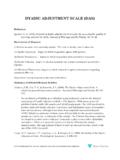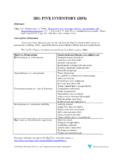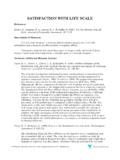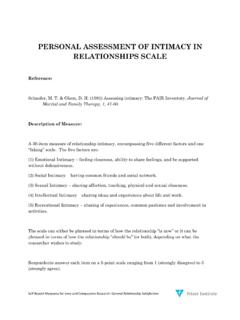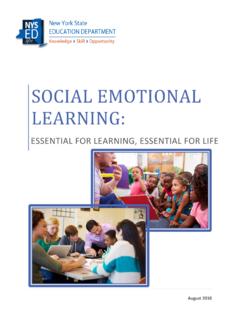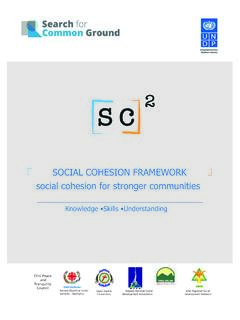Transcription of SOCIAL SUPPORT QUESTIONNAIRE - Fetzer Institute
1 Self Report Measures for Love and Compassion Research: SOCIAL SUPPORT SOCIAL SUPPORT QUESTIONNAIRE Reference: Sarason, , Levine, , Basham, , et al. (1983). assessing SOCIAL SUPPORT : The SOCIAL SUPPORT QUESTIONNAIRE . Journal of Personality and SOCIAL Psychology, 44, 127-139. Description of Measure: A 27-item QUESTIONNAIRE designed to measure perceptions of SOCIAL SUPPORT and satisfaction with that SOCIAL SUPPORT . Each item is a question that solicits a two-part answer: Part 1 asks participants to list all the people that fit the description of the question, and Part 2 asks participants to indicate how satisfied they are, in general, with these people. Abstracts of Selected Related Articles: Sarason, I. G., Sarason, B. R., Shearin, E. N., Pierce, G. R. (1987). A brief measure of SOCIAL SUPPORT : Practical and theoretical implications. Journal of SOCIAL and Personal Relationships, 4, 497-510.
2 Two studies leading to the development of a short form of the SOCIAL SUPPORT QUESTIONNAIRE (SSQ) are reported. In Study 1 three items selected for high correlations with the total score (SSQ3) were administered to 182 university students together with several personality measures. SSQ3 had acceptable test-retest reliability and correlations with personality variables similar to those of the SSQ. Internal reliability was marginal although acceptable for an instrument with so few items. Study 2 employed three sets of data in developing a six-item instrument (SSQ6). The SSQ6 had high internal reliability and correlated highly with the SSQ and similarly to it with personality variables. The research findings accompanying the development of the short form SOCIAL SUPPORT measure suggest that perceived SOCIAL SUPPORT in adults may be a reflection of early attachment experience.
3 Schaefer, C., Coyne, J. C., Lazarus, R. S. (1981). The health related functions of SOCIAL SUPPORT . Journal of Behavioral Medicine, 4, 381-406. SOCIAL SUPPORT research has been hampered by a lack of clarity both in the definitions of SOCIAL SUPPORT and in the conceptualization of its effects on health outcomes. The present study compared SOCIAL network size and three types of perceived SOCIAL SUPPORT tangible, emotional, and informational in relation to stressful life events, psychological symptoms and morale, and physical health status in a sample of 100 persons 45 64 years old. SOCIAL network size was empirically separable from, though correlated with, perceived SOCIAL SUPPORT and had a weaker overall relationship to outcomes than did SUPPORT . Low tangible SUPPORT and emotional SUPPORT , in addition to certain life events, were independently related to depression and negative morale; informational SUPPORT was associated with positive morale.
4 Neither SOCIAL SUPPORT nor stressful life events were associated with physical Self Report Measures for Love and Compassion Research: SOCIAL SUPPORT health. It was concluded that SOCIAL SUPPORT research would benefit from attention to the multidimensionality of SUPPORT and greater specificity in hypotheses about the relationship between types of SUPPORT and adaptational outcomes. Pierce, G. R., Sarason, I. G., & Sarason, B. R. (1991). General and relationship-based perceptions of SOCIAL SUPPORT : are two constructs better than one? Journal of Personality and SOCIAL Psychology, 61, 1028-1039. Two hypotheses derived from a theory of perceived SOCIAL SUPPORT were investigated: (a) relationship-based perceptions of SOCIAL SUPPORT are distinct from general perceptions of SUPPORT , and (b) measures of each construct contribute uniquely to the prediction of loneliness.
5 Ninety-four male and 116 female undergraduates completed measures of loneliness and general perceived SOCIAL SUPPORT and the Quality of Relationships Inventory, a new instrument to assess relationship-based perceptions of SOCIAL SUPPORT , conflict, and depth in specific relationships. General and relationship-based perceptions of SOCIAL SUPPORT were found to be related, but empirically distinct, constructs. Relationship-based perceptions of SUPPORT and conflict from mothers and friends each added to the prediction of loneliness after considering the contribution of general perceived SOCIAL SUPPORT . Implications of these findings for understanding the perceived SOCIAL SUPPORT construct are discussed. Scale: The SSQ instructions, QUESTIONNAIRE Items, and Scoring Information is available at Self Report Measures for Love and Compassion Research: SOCIAL SUPPORT SOCIAL SUPPORT QUESTIONNAIRE shortened version Reference: Sarason, I.
6 G., Sarason, B. R., Shearin, E. N., Pierce, G. R. (1987). A brief measure of SOCIAL SUPPORT : Practical and theoretical implications. Journal of SOCIAL and Personal Relationships, 4, 497-510. Description of Measure: A 6-item QUESTIONNAIRE designed to measure SOCIAL SUPPORT . Each item is a question that solicits a two-part answer: Part 1 asks participants to list all the people that fit the description of the question, and Part 2 asks participants to indicate how satisfied they are, in general, with these people. This QUESTIONNAIRE is a shortened version of the original SOCIAL SUPPORT QUESTIONNAIRE (Sarason et al., 1983). Abstracts of Selected Related Articles: Sarason, , Levine, , Basham, , et al. (1983). assessing SOCIAL SUPPORT : The SOCIAL SUPPORT QUESTIONNAIRE . Journal of Personality and SOCIAL Psychology, 44, 127-139. A measure of SOCIAL SUPPORT , the SOCIAL SUPPORT QUESTIONNAIRE (SSQ), is described and four empirical studies employing it are described.
7 The SSQ yields scores for (a) number of SOCIAL supports, and (b) satisfaction with SOCIAL SUPPORT that is available. Three of the studies deal with the SSQ's psychometric properties, its correations with measures of personality and adjustment, and the relationship of the SSQ to positive and negative life changes. The fourth study was an experimental investigation of the relationship between SOCIAL SUPPORT and persistence in working on a complex, frustrating task. The research reported suggests that the SSQ is a reliable instrument, and that SOCIAL SUPPORT is (1) more strongly related to positive than negative life changes, (2) more related in a negative direction to psychological discomfort among women than men, and (3) an asset in enabling a person to persist at a task under frustrating conditions. Research and clinical implications are discussed. Leserman, J.
8 , Petitto, J. M., Golden, R. N., et al. (2000). Impact of stressful life events, depression, SOCIAL SUPPORT , coping, and cortisol on progression to AIDS. The American Journal of Psychiatry, 157, 1221-1228. OBJECTIVE: This study examined prospectively the effects of stressful events, depressive symptoms, SOCIAL SUPPORT , coping methods, and cortisol levels on progression of HIV-1 infection. METHOD: Eighty-two homosexual men with HIV type-1 infection without AIDS or symptoms at baseline were studied every 6 months for up to years. Men were recruited from rural and urban areas in North Carolina, and none was using antiretroviral medications at entry. Disease Self Report Measures for Love and Compassion Research: SOCIAL SUPPORT progression was defined as CD4+ lymphocyte count <200/ l or the presence of an AIDS indicator condition. RESULTS: Cox regression models with time-dependent covariates were used adjusting for race, baseline CD4+ count and viral load, and cumulative average antiretroviral medications.
9 Faster progression to AIDS was associated with higher cumulative average stressful life events, coping by means of denial, and higher serum cortisol as well as with lower cumulative average satisfaction with SOCIAL SUPPORT . Other background ( , age, education) and health habit variables ( , tobacco use, risky sexual behavior) did not significantly predict disease progression. The risk of AIDS was approximately doubled for every decrease in cumulative average SUPPORT satisfaction and for every cumulative average increase of one severe stressor, one unit of denial, and 5 mg/dl of cortisol. CONCLUSIONS: Further research is needed to determine if treatments based on these findings might alter the clinical course of HIV-1 infection. Dumont, M. & Provost, M. A. (1999). Resilience in adolescents: Protective role of SOCIAL SUPPORT , coping strategies, self-esteem, and SOCIAL activities on experience of stress and depression.
10 Journal of Youth and Adolescence, 28, 343-363. In this study, 297 adolescents (141 eighth graders and 156 eleventh graders) were classified into 3 groups created from crossing scores of depressive symptoms and frequency of daily hassles: well adjusted, resilient, and vulnerable. A discriminant function analysis was performed to investigate group differences on self-esteem, SOCIAL SUPPORT , different strategies of coping, and different aspects of SOCIAL life. The analysis revealed that self-esteem, problem-solving coping strategies, and antisocial and illegal activities with peers helped to discriminate groups: Well-adjusted adolescents had higher self-esteem than adolescents in the 2 other groups; in addition, resilient adolescents had higher self-esteem than vulnerable adolescents. For the second significant discriminating variables, antisocial and illegal activities with peers, both resilient and vulnerable adolescents had higher scores than well-adjusted adolescents.
